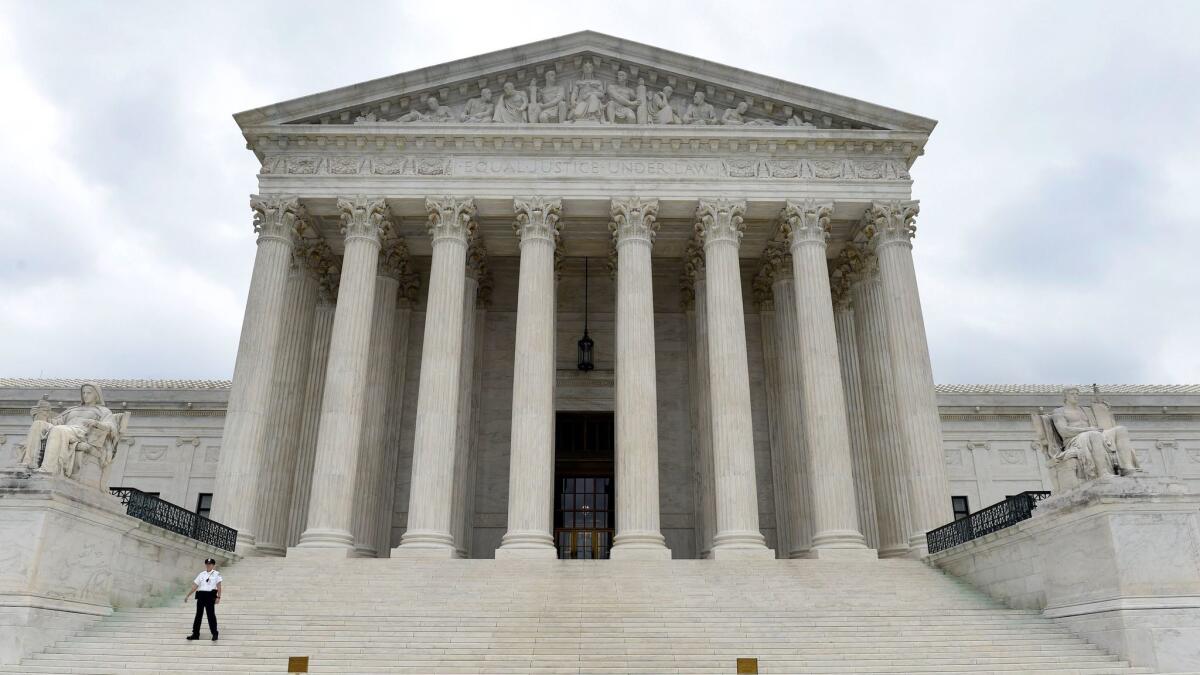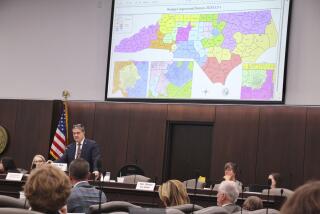Editorial: The Supreme Court strikes a blow against gerrymanders, but not a knockout punch

On Monday, the Supreme Court agreed with a lower court that North Carolina legislators had improperly taken race into account when they redrew the lines of two congressional districts in a way that made it easier for Republican candidates to prevail in other districts in the state.
The ruling is a welcome blow against the time-dishonored practice of gerrymandering — drawing district lines to give one party an unfair advantage — but it won’t eliminate the practice completely. That will require a future ruling in which the court holds that gerrymandering even in the absence of racial considerations violates the Constitution.
After the 2010 census, North Carolina’s Republican-controlled legislature redrew the lines of the state’s congressional districts to increase the black voting-age population of two districts that already had significant (though not quite majority) black populations.
The state asserted that it had given one of the districts a majority of black voters to comply with the federal Voting Rights Act, which under certain circumstances can require such a district. With the second district, the state argued that increasing of the number of eligible black voters was motivated not by race but by purely partisan considerations.
Instead of viewing partisan gerrymanders as a violation of equal protection...the court might see them as violations of the 1st Amendment.
Under previous Supreme Court rulings, it’s a violation of the Equal Protection Clause of the 14th Amendment if a state uses race as the “predominant factor in drawing district lines.” The only exception is when a state has a compelling reason to do so, such as complying with the Voting Rights Act’s requirement that minority voters not be unfairly prevented from electing the candidates of their choice.
Writing for the majority on Monday, Justice Elena Kagan indicated that the state didn’t need to add black voters to one of the two North Carolina districts to comply with the Voting Rights Act because the district had a history of white voters “crossing over” to help black voters elect candidates of their choice. This sort of “packing” actually serves to dilute blacks’ voting power in other districts.
Nor did Kagan accept that the state added blacks to the second district just to secure a partisan advantage. Kagan questioned the state’s argument that mapmakers “drew their lines … to ‘pack’ District 12 with Democrats, not African-Americans.” Instead, the justice said, a lower court had good reason based on witness testimony to conclude that race, not politics, was the predominant factor.
Finally, Kagan rejected the argument that the voters who challenged the map were under any obligation to produce “an alternative [map] that achieves the legislature’s political objectives while improving racial balance.” That will make it easier for others to challenge similar gerrymanders.
Richard Hasen, an election law expert at UC Irvine law school, wrote Monday that Kagan’s opinion “is a major victory for voting rights plaintiffs, who have succeeded in turning the racial gerrymandering cause of action into an effective tool to go after partisan gerrymanders in Southern states.”
But even if he’s right, what about states in which legal challenges to partisan gerrymandering can’t be comfortably couched in racial terms? Partisan gerrymandering is a national problem. For example, according to a study by the Center for American Progress, Pennsylvania voters last year cast ballots for Democratic and Republican candidates for the U.S. House in roughly equal numbers, yet 13 of the state’s 18 House seats went to Republicans.
In 1986, the U.S. Supreme Court ruled that partisan gerrymandering could potentially be challenged as unconstitutional if it involved “intentional discrimination against an identifiable political group and an actual discriminatory effect on that group.” But the court in that case didn’t find such a violation, and in 2004, four justices led by the late Antonin Scalia said the court should stop looking and admit that “no judicially discernible and manageable standards for adjudicating political gerrymandering claims have emerged.”
In recent years, however, new challenges to partisan gerrymandering have been brought, generating more and more support for a proposition offered in 2004 by Justice Anthony Kennedy. Instead of viewing partisan gerrymanders as a violation of equal protection, Kennedy suggested that the court might see them as violations of the 1st Amendment because they penalize citizens for their political views or their association with a political party.
When the court next hears a case challenging a partisan gerrymander outside the context of race, it should make Kennedy’s insight the law of the land.
Follow the Opinion section on Twitter @latimesopinionand Facebook
More to Read
A cure for the common opinion
Get thought-provoking perspectives with our weekly newsletter.
You may occasionally receive promotional content from the Los Angeles Times.






